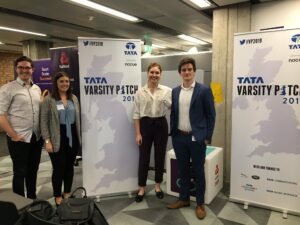A few colleagues at Tata Communications UK – Amit Sharma and Bijaya Basu in Marketing and Shubra Jain in IoT and Mobility Business Development – got the chance to act as judges in the semi-finals of the Tata Varsity Pitch competition. Here, they share their highlights from the day.
Can you tell us a bit about what this competition is all about?
Bijaya: The Tata Varsity Pitch is an annual early-stage pitching competition that celebrates the best businesses coming out of colleges and universities across the country. It’s powered by the UK’s National Association of College & University Entrepreneurs (NACUE), and Tata has been supporting the Varsity Pitch for years.
As 2019 marks the 10th anniversary of the competition, a few Tata companies like Tata Communications have come together to sponsor the different categories, help coach the shortlisted businesses and ultimately pick the winner.
“It’s been a bumper year for the competition, with 424 entries from across the country in total.”
What happened in the semi-finals?
 Amit: The semi-finals consisted of six categories, with five semi-finalists in each – so 30 presentations in total. Each of the semi-finalists started with a 2-minute pitch on their business, which was then followed by a 3-minute Q&A with a panel of three judges. All the semi-finalists were judged on three criteria: innovation, market opportunity – so, for example how the business will set itself apart from its competitors – and finally financial viability.
Amit: The semi-finals consisted of six categories, with five semi-finalists in each – so 30 presentations in total. Each of the semi-finalists started with a 2-minute pitch on their business, which was then followed by a 3-minute Q&A with a panel of three judges. All the semi-finalists were judged on three criteria: innovation, market opportunity – so, for example how the business will set itself apart from its competitors – and finally financial viability.
I was amazed by the semi-finalists’ ability to summarise what their business is all about in such a succinct, compelling way and not be fazed by the Dragons’ Den style format.
The category that we judged was IDEAS. To win this category, you might not have all the finer details around financial viability ironed out, and you might not have a website or even a prototype yet – but what you do need to have is a brilliant idea for a business and show that you’ve done your research on your industry.
Tell us a bit about the semi-finalists in the IDEAS category.
 Shubhra: There was a huge range of different business ideas, all in different stages of development. The entrepreneur behind Tree Sparks wants to help educate the next generation of environmentalists by lowering the barriers for young people to explore careers in forestry. The creator of MyPainScore is building an innovative app that leverages artificial intelligence to help people living with chronic pain to manage their pain and reduce their dependence on medication. The pair behind Calorie Balance wants to help tackle the growing obesity crisis in emerging markets like China by transforming people’s diets with their white bean products. And, the investors of Black Goblin Audio look to bring next-generation computer-generated synthetic sounds to visual content creators. Finally, the entrepreneur behind First Step has developed an idea for an ingenious self-administered forensic device that can detect the evidence of sexual assault.
Shubhra: There was a huge range of different business ideas, all in different stages of development. The entrepreneur behind Tree Sparks wants to help educate the next generation of environmentalists by lowering the barriers for young people to explore careers in forestry. The creator of MyPainScore is building an innovative app that leverages artificial intelligence to help people living with chronic pain to manage their pain and reduce their dependence on medication. The pair behind Calorie Balance wants to help tackle the growing obesity crisis in emerging markets like China by transforming people’s diets with their white bean products. And, the investors of Black Goblin Audio look to bring next-generation computer-generated synthetic sounds to visual content creators. Finally, the entrepreneur behind First Step has developed an idea for an ingenious self-administered forensic device that can detect the evidence of sexual assault.
“What all the entrepreneurs had in common was passion for their cause or the sector where they’re looking to make their mark.”
This also made picking the finalist of the five incredibly hard – but in the end we all agreed that First Step was the strongest contender and should go through to the finals.
What made First Step stand out for you?
 Bijaya: The pitch that Molly Steadman delivered for her idea was excellent from start to finish. She started by telling us how in the UK, 1 in 12 of female undergrad students are raped whilst at university, and due to memory blackouts and feelings of shame, most are unwilling to seek medical help or unable to report what has happened.
Bijaya: The pitch that Molly Steadman delivered for her idea was excellent from start to finish. She started by telling us how in the UK, 1 in 12 of female undergrad students are raped whilst at university, and due to memory blackouts and feelings of shame, most are unwilling to seek medical help or unable to report what has happened.
First Step helps victims of sexual assault by allowing them to take a swab test that detects the presence of the male Y chromosome. This then aims to give women the assurance and confidence to seek medical help and justice. To make First Step accessible for students, Molly would like to see it available at halls of residence at universities, for example.
We were impressed by her technical knowledge – she’d been doing a PhD in Biology. Yet, what really convinced us about the viability of her idea was that she had done her research and sought the counsel of experts in different fields from health clinics to forensics specialists to ensure that her solution is as good as it can be. Finally, she had passion and quiet confidence that shone through the 5-minute pitch.
What will happen next?
“The grand finale will take place in London on 20th November during Global Entrepreneurship Week.”
Amit: The top prize is £15,000 in cash to help get a fledgling business venture off ground, or to turn an initial idea like First Step into reality. The three of us will be rooting for Molly for sure!
This is such an exciting and rewarding initiative for Tata Communications to be part of; it’s an opportunity for us to support innovation in different industries, and help bring about the next big idea that could have a long-lasting positive impact on both people and businesses.
To learn more about Tata Communications’ approach to innovation and the Tata Varsity Pitch, read this blog post by Ankur Jindal, our Global Head of Corporate Venturing and Innovation.
Transformational Hybrid SolutionsOur cloud-enablement services offer the best performance on your traffic-heavy websites or mission-critical applications.
Core NetworksTata Communications™ global IT infrastructure and fibre network delivers the resources you need, when and where you need them.
Network Resources
Unified Communications As A ServiceBreak the barriers of borders efficiently and increase productivity with Tata Communications’ UC&C solutions.
Global SIP ConnectEmpower your business with our SIP network and witness it grow exponentially.
InstaCC™ - Contact Centre As A ServiceCloud contact centre solutions for digital customers experience and agent productivity.
DIGO – Communications Platform as a ServiceDIGO is an in-network cloud communications platform, enabling you to power up converged contextual human-to-everything conversations globally.
Unified Communication Resources Case studies, industry papers and other interesting content to help you explore our unified communications solution better.
IoT SolutionsThe Internet of Things is transforming the way we experience the world around us for good. Find out more about our Internet Of Things related solutions here.
Mobility SolutionsTata Communications’ mobility services enable your enterprise to maintain seamless communication across borders, with complete visibility of cost and usage.
Mobility & IoT Resources
Multi-Cloud SolutionsWith enterprises transitioning to a hybrid multi-cloud infrastructure, getting the right deployment model that yields ROI can be a daunting task.
Cloud ComplianceCompliant with data privacy standards across different countries and is also designed to protect customers’ privacy at all levels.
IZO™ Cloud Platform & ServicesIZO™ is a flexible, one-stop cloud enablement platform designed to help you navigate complexity for more agile business performance.
Managed Infrastructure ServicesIntegrated with our integrated Tier-1 network to help your business grow efficiently across borders.
Cloud PartnersWe support a global ecosystem for seamless, secure connectivity to multiple solutions through a single provider.
Cloud Resources
Governance, Risk, and ComplianceRisk and Threat management services to reduce security thefts across your business and improve overall efficiencies and costs.
Cloud SecurityBest-in-class security by our global secure web gateway helps provide visibility and control of users inside and outside the office.
Threat Management - SOCIndustry-leading threat-management service to minimise risk, with an efficient global solution against emerging security breaches and attacks.
Advanced Network SecurityManaged security services for a predictive and proactive range of solutions, driving visibility and context to prevent attacks.
Cyber Security ResourcesCase studies, industry papers and other interesting content to help you explore our securtiy solution better.
Hosted & Managed ServicesTata Communications provide new models for efficient wholesale carrier voice service management. With our managed hosting services make your voice business more efficient and better protected
Wholesale Voice Transport & Termination ServicesYour long-distance international voice traffic is in good hands. End-to-end, voice access & carrier services which includes voice transport and termination with a trusted, global partner.
Voice Access ServicesTata Communication’s provide solutions which take care of your carrier & voice services, from conferencing to call centre or business support applications.
Carrier Services Resources
CDN Acceleration ServicesOur CDN Web Site Acceleration (WSA) solution helps deliver static and dynamic content, guaranteeing higher performance for your website.
CDN SecuritySafeguard your website data and customers’ information by securing your website from hacks and other mala fide cyber activities.
Video CDNDeliver high-quality video content to your customers across platforms – website, app and OTT delivery.
CDN Resources
Elevate CXIncrease customer satisfaction while empowering your service team to deliver world-class customer experience and engagement.
Live Event ServicesTata Communications’ live event services help battle the share if eyeballs as on-demand video drives an explosion of diverse content available on tap for a global audience.
Media Cloud Infrastructure ServicesTata Communications’ media cloud infrastructure offers flexible storage & compute services to build custom media applications.
Global Media NetworkTata Communications’ global media network combines our expertise as a global tier-1 connectivity provider with our end-to-end media ecosystem.
Use CasesUse cases of Tata Communications’ Media Entertainment Services
Remote Production SolutionsMedia contribution, preparation and distribution are highly capital-intensive for producers of live TV and video content, and their workflows are complex.
Media Cloud Ecosystem SolutionsThe Tata Communications media cloud infrastructure services offer the basic building blocks for a cloud infrastructure-as-a-service.
Global Contribution & Distribution SolutionsTata Communications’ global contribution and distribution solution is built to reduce capital outlay and grow global footprint.
Satellite Alternative SolutionsAs more and more consumers choose to cut the cord & switch to internet-based entertainment options, broadcasters are faced with capital allocation decisions.
LeadershipA look into the pillars of Tata communications who carry the torch and are living embodiment of Tata’s values and ethos.
Culture & DiversityHere at Tata Communications we are committed to creating a culture of openness, curiosity and learning. We also believe in driving an extra mile to recognize new talent and cultivate skills.
OfficesA list of Tata Communications office locations worldwide.
SustainabilityTata Communications adopts a holistic approach and harnesses the power of new-age technologies like 5G, IoT and AI to build a sustainable digital world.
FAQCheck out our FAQs section for more information.
BoardHave a look at our board of members.
ResultsFind out more about our quarterly results.
Investor PresentationsFollow our repository of investor presentations.
FilingsGet all information regarding filings of Tata communications in one place.
Investor EventsAll investor related event schedule and information at one place.
GovernanceAt Tata, we believe in following our corporate social responsibility which is why we have set up a team for corporate governance.
SharesGet a better understanding of our shares, dividends etc.
SupportGet all investor related contact information here.


